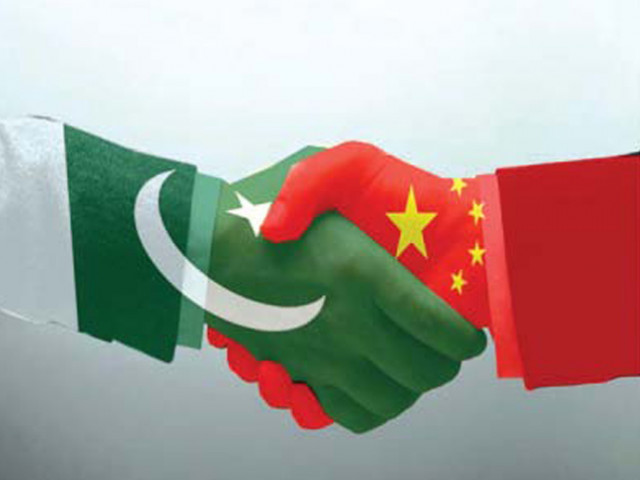Strengthening the bond between Pakistan, China
Beijing vows to support Islamabad's development goals, help fast-track implementation of CPEC 2.0

China and Pakistan share a resilient bond, a brotherly bond, and a bond built on trust and common values – an ironclad friendship forged through history and growing stronger with time, President Xi said while meeting PM Shehbaz Sharif. These words are simple but carry a powerful message, encapsulating the entire Pak-China relationship.
Let's decode the words and understand the message. First, the bond is resilient, meaning it can withstand even the toughest situations. History shows every difficult moment has given new strength to the relationship. Many examples prove this, where both countries stood shoulder to shoulder, regardless of circumstances.
After China's founding, Pakistan faced intense pressure from the US and the West not to establish ties. The West sought to isolate China. Pakistan refused to compromise and did not bow to pressure.
Second, the relationship is a brotherly bond, meaning both care for each other and share common interests. Several examples support this. After the establishment of the People's Republic of China, Taiwan was granted China's UN and Security Council seat.
Pakistan rejected this and strongly advocated for China's rights. Pakistan also provided an air corridor to China, connecting it with the world. Lastly, Pakistan helped China and the US build relations, opening a new world for Beijing.
China has always responded with the same spirit. During the wars of 1965, 1971, and 2025, it stood firmly by Pakistan's side. The most notable example is the China-Pakistan Economic Corridor (CPEC). China offered CPEC to Pakistan when it was in its greatest need.
At that time, Pakistan faced its worst wave of terrorism, a crippled economy, rising unemployment, and load shedding that devastated the economy and social fabric. The world refused to invest in Pakistan. Even allies in the war on terror refused to invest and instead campaigned against Pakistan, declaring it unsafe for living and investment.
Amid these dire circumstances, China stepped forward and offered CPEC. China invested nearly $28 billion under CPEC, creating about 236,000 jobs in Pakistan.
Third, the relationship is built on trust. Both countries listen to each other and trust each other. They do not listen to third parties or rumours. For example, after Pakistan signed the Seato and Cento treaties, some countries told China that Pakistan was forming an alliance against it. China did not believe it.
Fourth, the China-Pakistan relationship is built on common values. Many highlight that both countries have different political systems. Yes, they do, but both systems are built on many common values. China practices socialism and Pakistan practices Islam, which share several values.
Islam teaches that humans are central; the system must revolve around people and their welfare. Islam emphasises justice and accountability, with no one above the law. Islam stresses leadership character; a leader must be pious, honest, and fair, guiding people to follow them. Islam also promotes peace at all levels.
Similarly, Chinese socialism emphasises placing people at the centre of policymaking to ensure welfare. It advocates justice, accountability, and rule of law. It requires leaders to demonstrate honesty and integrity. It calls on people to follow leadership. It promotes peace and coexistence. From this, it is clear both countries share similar values, which strengthen their bond. President Xi's statement concluded the debate on systems.
President Xi also told PM Sharif that China is willing and will continue to work with Pakistan to support its development goals. China supports the fast implementation of CPEC 2.0. It is ready to upgrade the China-Pakistan Free Trade Agreement and step up cooperation in industries, agriculture, and mining, to boost Pakistan's capacity for development.
However, President Xi also highlighted the importance of the safety and security of Chinese nationals, investments, and institutions in Pakistan. Pakistan places the same emphasis on the safety of Chinese people and interests. This was clear from the presence of Army Chief Field Marshal Asim Munir in the meeting with President Xi.
While Pakistan is doing its best to address the challenge, the scope is vast, making it hard for Pakistan to manage alone. Thus, Pakistan and China must collaborate to develop and implement a joint security framework.
Security cooperation should be divided into two areas: domestic and international. On the domestic side, both should cooperate with intelligence agencies and establish the Pakistan-China Intelligence Agency Network. Second, they should map security requirements for the second phase. They must identify stakeholders, opponents, enemies, and fake friends. Pakistan should draw a clear line between its friends and its enemies, opponents, and counterfeit friends.
Third, both sides must build strong platforms to shape their narratives, using facts and data to oppose fifth-generation warfare. This is crucial because opponents of CPEC and China-Pakistan relations spread false narratives to harm cooperation. They spread fake news about Xinjiang to promote terrorism and attacks. They have also pushed conspiracy theories like the debt trap.
Fourth, the police must be strengthened and take a leading role at the local level. Police have a broader network on the ground and experience working with communities. For this to happen, investment is needed to build police capacity.
On the global front, they should jointly approach the UN Security Council and ask it to treat terrorism according to its resolutions and sanction countries supporting terrorism, such as India. These countries should also be reported to FATF for terror financing. Both must work to bring financiers under the law and onto FATF's grey or blacklist.
In conclusion, the joint security framework is not a choice; it is a necessity. It will bring multiple benefits. First, pooling resources and collaboration will match opponents' resources and deter their efforts. Second, China will gain direct insight into threats against its nationals.
Pakistan should ignore propaganda aimed at undermining security cooperation. Such criticism is intentional. Opponents know joint efforts pose a threat to their plans. Therefore, Pakistan should explore all avenues to enhance collaboration with China on security. Lastly, it is hoped Pakistan and China will tackle security issues with resilience and brotherhood, as President Xi defined.
THE WRITER IS A POLITICAL ECONOMIST AND A VISITING RESEARCH FELLOW AT HEBEI UNIVERSITY, CHINA




















COMMENTS (1)
Comments are moderated and generally will be posted if they are on-topic and not abusive.
For more information, please see our Comments FAQ